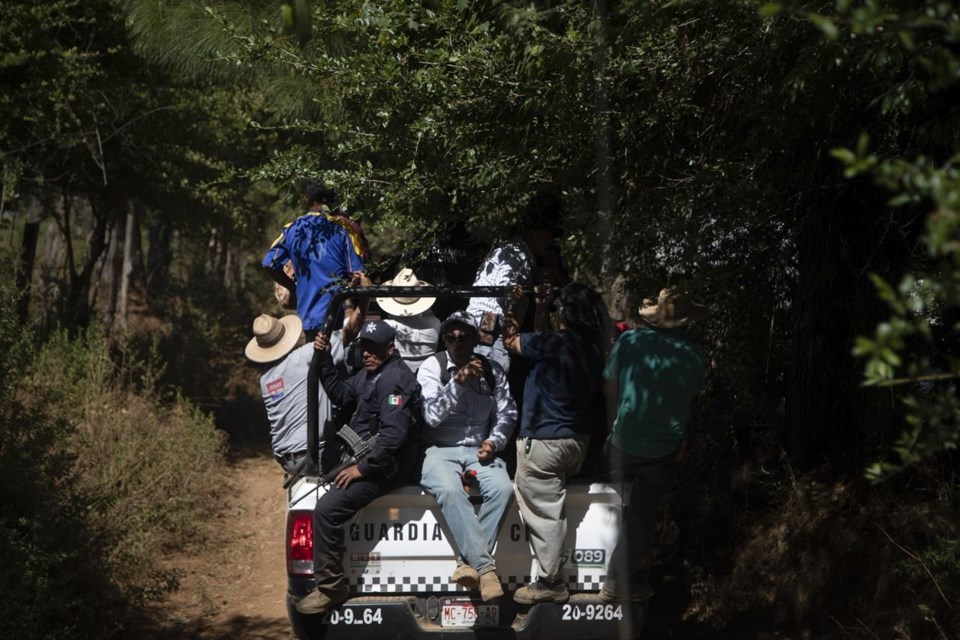VILLA MADERO, Mexico (AP) ΓÇö As , angry subsistence farmers have begun taking direct action on thirsty avocado orchards and berry fields of commercial farms that are drying up streams in the mountains west of Mexico City.
Rivers and even whole lakes are disappearing in the once green and lush state of Michoacan, as the drought combines with a surge in the use of water for
In recent days, subsistence farmers and activists from the Michoacan town of Villa Madero organized teams to go into the mountains and rip out illegal water pumps and breach unlicensed irrigation holding ponds.
A potential conflict looms with avocado growers ΓÇö who are often sponsored by, or pay protection money to, drug cartels.
Last week, dozens of residents, farmworkers and small-scale farmers from Villa Madero hiked up into the hills to tear out irrigation equipment using mountain springs to water avocado orchards carved out of the pine-covered hills.
The week before, another group went up with picks and shovels and breached the walls of an illegal containment pond that sucked up water from a spring that had supplied local residents for hundreds of years.
ΓÇ£In the last 10 years, the streams, the springs, the rivers have been drying up and the water has been captured, mainly to be used for avocados and berries,ΓÇ¥ said local activist Julio Santoyo, one of the organizers of the effort. ΓÇ£There are hamlets in the lower part of the township that no longer have water.ΓÇ¥
Santoyo estimated that about 850 of the plastic-lined, earthen containment ponds have sprung up in the hills around Villa Madero, usually soon after planters have illegally logged or burned the native pine forest. Pines help the soil retain water, while avocado trees deplete it.
Francisco Gómez Cortés said residents of his hamlet, El Sauz, had been asking the landowner for 15 years to allow the spring to flow downhill to their community.
After a year in which residents became desperate, and last week they worked up the courage to hike up the hill and rip out pumps and hoses for the avocado orchard.
“We don't have enough water for human consumption,” Gómez Cortés said.
ΓÇ£ItΓÇÖs sad. ItΓÇÖs sad to walk down these trails that are now dry, when they once had trees and springs,ΓÇ¥ he said. ΓÇ£They havenΓÇÖt even left any water for the (forest) animals that nest along the banks.ΓÇ¥
In a sign of how seriously the local government is taking the potential threat, the group was accompanied by the mayor of Villa Madero, who blamed outsiders for the problem.
ΓÇ£There are people who aren't from this town, who come to our township and are invading us,ΓÇ¥ Mayor Froylan Alcauter Ibarra said. ΓÇ£They are taking water away from the people who live downhill, and they don't realize these are the poorest people.ΓÇ¥
Residents say they don't want to deny water entirely to the orchards and have proposed an agreement to give landowners 20% of the water from local streams, if they allow the remaining 80% to keep flowing. They say they haven't gotten any response yet.
Drug cartels often make money from illegal logging and in Michoacan. The activists around Villa Madero have suffered threats, kidnappings and beatings in the past.
“We are running a serious risk of them killing us for protesting,” Gómez Cortés said. “Out of necessity, we are doing what the government should be doing.”
The government has long done little to limit the growers and combat deforestation and water takeovers. But it does seem to have developed a sudden interest in preventing the looming conflict.
In March, activists organized a meeting nearby at Patzcuaro Lake to demand authorities do something about the fast-declining water levels. Patzcuaro is a shallow but extensive lake in Michoacan with a beautiful colonial town on its shores and an island of fishermen perched in the middle.
The fishermen of Janitzio island with their shallow boats and hooped, figure-eight nets were made famous by photographers and filmmakers in the 1940s and 50s as a symbol of Mexico's folk traditions. The town of Patzcuaro draws hundreds of thousands of tourists.
But due to the drought, deforestation, sediment buildup and the increased water demands from avocado and berry growers, Patzcuaro lake has been reduced to about half its size. You can now reach the Janitzio island by wading, and activist Juan Manuel Valenzuela estimates that 90% of the boats that used to fish and ferry tourists around are now out of service.
Nearby Lake Cuitzeo, one of the largest freshwater lakes in Mexico, is now nearly dried up.
ΓÇ£We cannot allow them to extinguish our lakes,ΓÇ¥ Valenzuela said. ΓÇ£It would be a tragedy for Michoacan.ΓÇ¥
Alejandro Méndez, Michoacan's state environment secretary, acknowledges that the problem has gotten out of hand. So scarce has water become in the once-lushly forested lake areas that orchard owners often send tanker trucks to suck thousands of gallons from the lake to water their groves.
“As many as 100 trucks could be seen taking water from the lake,” Méndez said of the situation in March.
So about a week ago, the state police began patrolling the lake shore and detaining any truck drivers they saw extracting water. And Méndez said the state has begun monitoring agricultural holding ponds to see if any are getting refilled from the lake.
While Lake Patzcuaro has grown and shrunk in the past, this time it may be terminal; farmers are starting to pasture livestock and plant crops on the lake bed.
“It will be difficult, because the humans and the livestock will survive, barely, but the animals and the plants will be gone — that will all be dried up and gone,” Gómez Cortés said.
___
AP writer Mark Stevenson in Mexico City contributed to this report.
___
Follow APΓÇÖs coverage of Latin America and the Caribbean at
Armando Solís, The Associated Press




